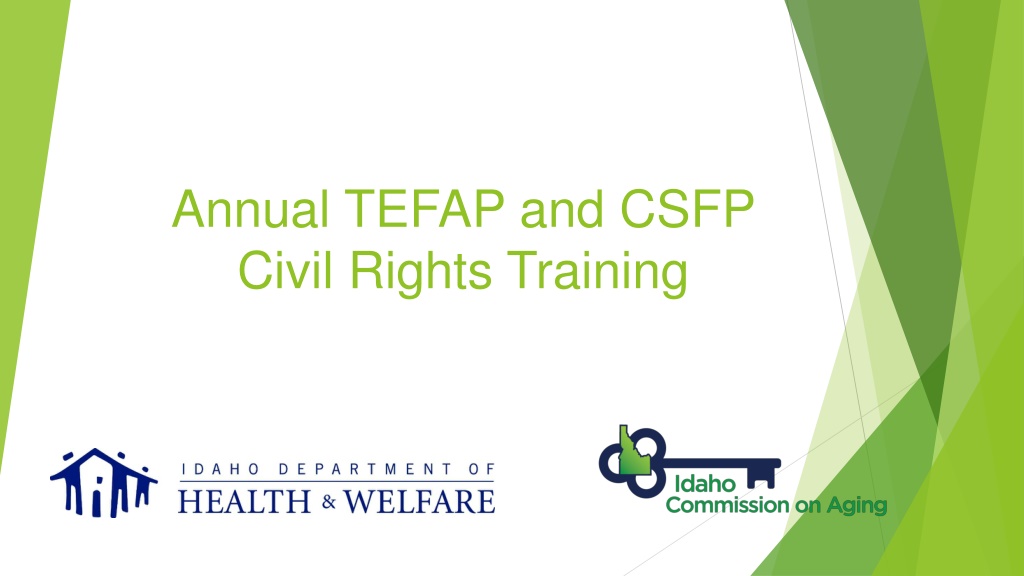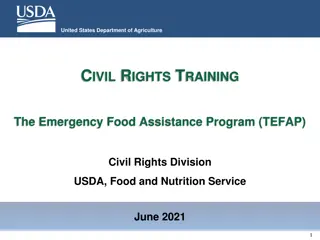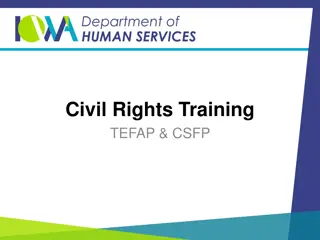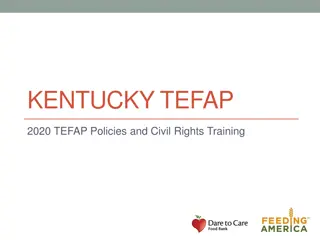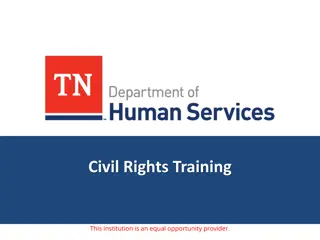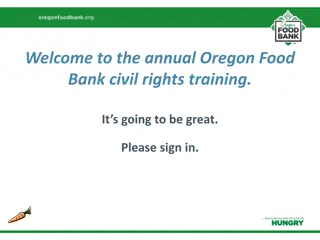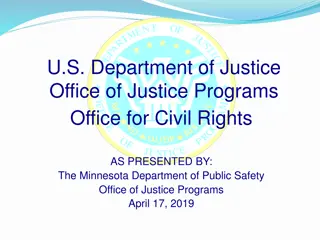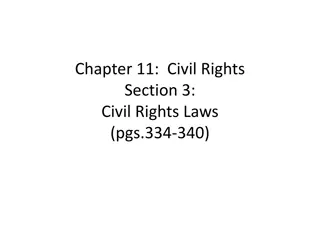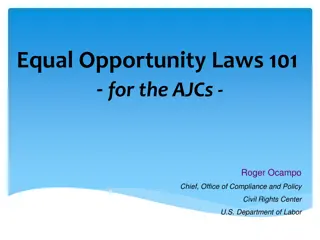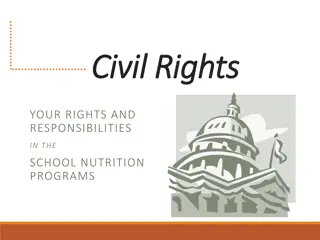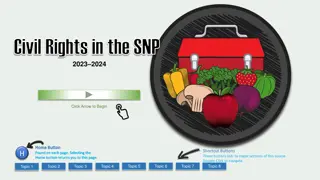Understanding Civil Rights Training for TEFAP and CSFP Programs
Annual Civil Rights Training for TEFAP and CSFP programs ensures non-discriminatory access to benefits. The training covers legal requirements, discrimination issues, protected classes, and procedures for resolving conflicts and complaints, aiming for equal treatment, elimination of barriers, and staff understanding of civil rights laws. Terminology and key concepts are explained to ensure compliance and dignity for all beneficiaries.
Download Presentation

Please find below an Image/Link to download the presentation.
The content on the website is provided AS IS for your information and personal use only. It may not be sold, licensed, or shared on other websites without obtaining consent from the author. Download presentation by click this link. If you encounter any issues during the download, it is possible that the publisher has removed the file from their server.
E N D
Presentation Transcript
Annual TEFAP and CSFP Civil Rights Training
Purpose and Overview Purpose: Through Title VI of the Civil Rights Act of 1964, Title IX of the Education Amendments, and Section 504 of the Rehabilitation Act, among other federal civil rights laws and authorities, USDA seeks to ensure that TEFAP and CSFP benefits are made available to all eligible persons in a non-discriminatory manner. Overview: Assurances Training requirements Discrimination Protected classes Disability discrimination and reasonable accommodation Limited English Proficiency (LEP) and requirements for language assistance Equal opportunity for religious organizations Nondiscrimination statements Effective public notification systems Collection and use of data Complaint procedures Conflict resolution Compliance reviews Resolution of noncompliance Customer service
Goals of Civil Rights Training Equal treatment for all beneficiaries and applicants Elimination of illegal barriers that prevent or deter people from applying for and receiving benefits Knowledge of rights and responsibilities Dignity and respect for all Staff gain an understanding of civil right laws, regulations, procedures, and instructions
Terminology: Civil Rights Civil Rights the nonpolitical rights of a citizen; the rights of personal liberty guaranteed to U.S. citizens by the 13th and 14th Amendments to the U.S. Constitution and by acts of Congress Disability a physical or mental impairment that substantially limits one or more of an individual s major life activities, having a record of such impairment, or being regarded as having such an impairment Discrimination - the act of distinguishing one person or group of persons from others, either intentionally, by neglect, or by the effect of actions or lack of actions based on their protected bases
Terminology: Civil Rights (cont.) USDA - United States Department of Agriculture FNS Food and Nutrition Services FNS Instruction 113-1 instruction published by USDA that outlines Civil Rights Responsibilities Distributing Agencies - any CSFP and TEFAP location distributing food to eligible participants
Federally Assisted Programs CSFP, Commodity Supplemental Food Program - monthly food box for individuals aged 60 years and over TEFAP, The Emergency Food Assistance Program - federal commodities available for low-income families
Assurances To qualify for Federal financial assistance, the program application must be accompanied by a written assurance that the program or facility will be operated in compliance with the Civil Rights laws and implementing nondiscrimination regulations. A Civil Rights assurance statement must be incorporated in all agreements between Federal & State agencies, State & sub-recipient agencies, and sub- recipient agencies & their local sites. (FNS Instruction 113-1, Appendix C)
Civil Rights Laws Title VI of the Civil Rights Act of 1964 - race, color, and national origin Civil Rights Restoration Act of 1987 - clarifies the scope of the Civil Rights Act of 1964 Sections 504 and 508 of the Rehabilitation Act of 1973 & Americans w/Disabilities Act disability Title IX of the Education Amendments of 1972 sex Age Discrimination Act of 1975 age
Civil Rights Laws 7 CFR Part 16, Equal Opportunity for Religious Organizations - partners with religious affiliations Ensures a level playing field for the participation of faith-based organizations and other community organizations in USDA programs Allows religious organizations that participate in USDA programs to retain their independence, provided that direct USDA funds do not support any inherently religious activities such as worship Ensures that no organization that receives direct federal financial service can discriminate against a program beneficiary, or prospective beneficiary, on the basis of religion or religious belief Program Policy Memos from November 2016 provide additional guidance: o FD-141 o FD-142
Training Requirement Sub-recipient agencies are responsible for training their local sites, including paid or volunteer staff who interact with participants or participant records, on an annual basis. New employees must be trained before participating in Federally Assisted Program activities. Volunteers must receive training appropriate to their roles and responsibilities.
Civil Rights and the USDA Food and Nutrition Service (FNS) explains their policy and regulations regarding Civil Rights through their FNS Instruction 113-1 This document can be found at: https://fns-prod.azureedge.net/sites/default/files/113-1.pdf
What is Discrimination? when an individual or group of individuals are, intentionally or by neglect: Denied benefits or services that others receive Delayed receiving benefits or services that others receive, or Treated Differently than others to their disadvantage.
What are the protected classes? Race Color National Origin Age Sex Disability
Disability Discrimination Under Section 504 of the Rehabilitation Act of 1973, and the Americans with Disabilities Act (ADA) of 1990, a "person with a disability" means any person who: has a physical or mental impairment which substantially limits one or more major life activities has a record of such an impairment, or is regarded as having such an impairment. The ADA Amendments Act of 2008 significantly expanded and clarified the definition of disability in the following ways: major life activity includes functions such as caring for one s self, performing manual tasks, walking, seeing, hearing, speaking, breathing, learning, and working it also includes functions of the immune system; normal cell growth; digestive, bowel, bladder, neurological, brain, respiratory, circulatory, cardiovascular, endocrine, and reproductive functions
Reasonable Accommodation There is an obligation to ensure that members of the public, and individuals with disabilities, are provided reasonable accommodations in order to access USDA programs, including: Wheelchair access Access to program information online and in-person (Consider alternative formats for persons with visual impairments or other disabilities) Physical assistance Nutrition information Food allergies Access to applications Accommodations/Modifications addressed in 504, Individual Education Plan (IEP), Individual Service Family Plan (ISFP) Accommodations must be provided at no cost to applicants/participants Chairs for participants standing in line (Sections 504 and 508 of the Rehabilitation Act of 1973 & Americans w/Disabilities Act)
Limited English Proficiency (LEP) Limited English Proficiency (LEP) definition: individuals who do not speak English as their primary language and who have a limited ability to read, speak, write, or understand English State agencies, local agencies, and other sub-recipients must take reasonable steps to assure meaningful access to their programs and activities by persons with Limited English Proficiency (LEP) Agencies must conduct assessments to determine language profile for their service areas, taking into account regional differences and updating as appropriate Translation of vital documents is required Notification of free interpretation services is required Staff training regarding how to provide LEP populations with meaningful access is paramount
Language Assistance Additional Considerations in a Limited English Proficiency (LEP) Plan: Outreach Material Nutrition Information/Menu Signs Posting Rules Form Assistance Informational Brochures Letters to families and notifications Resources available to the recipient and costs
Language Assistance Language services must be provided free of charge Children should not be used as interpreters Examples of language services: Bilingual staff Telephone interpreter lines Oral interpretation services Written language services Community organizations and volunteers
Language Assistance Population data sources to use in conducting service area language assessment: Interagency LEP Website Mapping Tool http://www.lep.gov/maps/ US Census Data http://www.census.gov/2010census/data/ American Community Survey http://www.census.gov/acs/ Migration Policy Institute s National Center on Immigrant Integration Policy http://www.migrationpolicy.org/
Public Notification All FNS assistance programs must include a public notification system that includes: Program Availability Inform applicants, participants, and potentially eligible persons of their program rights and responsibilities and the steps necessary for participation. Complaint Information Advise applicants and participants at the service delivery point of their right to file a complaint, how to file a complaint, and the complaint procedures. Nondiscrimination Statement All information materials and sources, including Web sites, used by FNS, State agencies, local agencies, or other sub-recipients to inform the public about FNS programs must contain a nondiscrimination statement.
Elements of a Public Notification System State agencies and their sub-recipients must: Make program information available to the general public by offering information pertaining to: Eligibility, benefits, and services Location of local facilities or service delivery points Hours of service Prominently display the And Justice For All poster. Inform potentially eligible persons, applicants, participants and grassroots organizations of programs or changes in programs. Convey the message of equal opportunity in all photos and other graphics that are used to provide program or program-related information. Provide appropriate information in alternative formats for persons with disabilities and in the appropriate language(s) for LEP persons.
Racial and Ethnic Data Collection CSFP - every April, distributing agencies are required to collect racial and ethnic data of individuals participating in the Commodity Supplemental Food Program. The local agency (The Idaho Foodbank) reports this racial and ethnic data to the state agency (Idaho Commission on Aging). The state agency (Idaho Commission on Aging) reports this information to FNS (Food and Nutrition Services) in the FNS -191 report. TEFAP - does not have a racial or ethnic data collection requirement, per FNS Instruction 113-1, Appendix C, Section D DATA COLLECTION AND REPORTING. Reported racial and ethnic data has no impact on program eligibility for individuals.
Racial and Ethnic Data Collection Ethnic/Racial Categories Two separate categories as federally recognized by the Office of Management and Budget. All federally-funded programs must collect and report this data Ethnic categories: Hispanic or Latino - a person of Cuban, Mexican, Puerto Rican, South or Central American, or other Spanish culture or origin, regardless of race Not Hispanic or Latino Racial categories: Black or African American Asian American Indian & Alaska Native White Native Hawaiian or Other Pacific Islander
Civil Rights Complaint A Civil Rights complaint may be either verbal or written. A Civil Rights complaint alleges that a discrimination has occurred based on one of the six protected classes: Race Color National origin Sex Age Disability
Civil Rights Complaint Procedure Right to File - any person alleging discrimination based on a protected class has the right to file a complaint within 180 days of the discriminatory action. Acceptance - all civil rights complaints, written or verbal, are accepted and forwarded to the Civil Rights division of FNS within 5 business days. Method - an individual may file a Civil Rights complaint directly to FNS through email, fax, phone, mail, or online. Information is available on the And Justice for All poster. An individual may also submit a written or verbal complaint to any agency distributing CSFP or TEFAP.
Records Management Distributing Agencies must keep a Civil Rights Binder or File with the required civil rights complaint documents including: Written civil rights complaint procedure. Annually dated civil rights complaint log, even when no complaints are received/documented. Copies of civil rights complaint forms Spanish and English (Complaint forms must be available at all sites). Documentation that site volunteers and staff have completed appropriate Civil Rights training every year. Information in the Civil Rights binder/file must be annually updated and maintained for three years plus the current year.
Civil Rights Complaint Procedure Written or verbal Civil Rights complaint received by agency. Agency documents Civil Rights complaint in the Civil Rights complaint log. Agency gives complainant Civil Rights Complaint Form and/or assists in completing the form. Agency notifies program point of contact about the complaint for further instruction and forwarding to FNS.
Verbal Complaints A complainant may allege discrimination verbally in person or over the phone. In this event, the person to whom the allegations are made shall write up the elements of the complaint and, at minimum, attempt to collect the following information: Contact information for the complainant. Specific location and name of the entity delivering the service or benefit. The nature of the incident or action that led the complainant to feel discrimination was a factor. The basis on which the complainant feels discrimination exists. The names, titles, and business addresses of persons who may have knowledge of the discriminatory action. The date(s) during which the alleged discriminatory actions occurred or, if continuing, the duration of such actions.
Where to file Complaints To file a program complaint of discrimination, complete the USDA Program Discrimination Complaint form (AD-3027)found online at: How to File a Complaint , http://www.ascr.usda.gov/complaint_ filing_cust.html, and at any USDA office, or write a letter addressed to USDA and provide in the letter all of the information requested in the form. To request a copy of the complaint form, call (866) 632-9992. Submit your completed form or letter to USDA by: Mail: U.S. Department of Agriculture Office of the Assistant Secretary for Civil Rights 1400 Independence Avenue, SW Washington, DC 20250-9410; or Fax: 202-690-7442; or Email: program.intake@usda.gov All written or verbal complaints alleging discrimination on the basis of race, color, national origin, sex, age, or disability shall be processed within 90 days upon receipt.
Customer Service Smile and be pleasant. Treat everyone with respect and courtesy. Be caring and understanding. Be a good listener. Offer assistance. Serve clients in a timely manner. Apologize for any inconveniences. Make clients feel appreciated. Make sure program is available to all. No discrimination/segregation.
Conflict Resolution Be calm, non-defensive, and respectful in interactions. Recognize and respond to things that matter Seek compromise within program regulations. If resolution is not achieved, seek assistance from leadership. Review the situation with supervisor to review strategies for addressing future conflicts.
Civil Rights Compliance Review A compliance review will include but is not limited to: Verifying all Civil Rights training documentation; Confirming the Civil Rights Statement is on materials referencing the CSFP or TEFAP programs; Confirming the USDA-approved Civil Rights statement is on the agency website; Checking that data on race and ethnicity is collected appropriately (CSFP only); If applicable, confirm all unresolved Civil Rights complaints were escalated to the program point of contact. Verifying that the USDA And Justice for All poster is displayed and visible to clients; Confirming that reasonable accommodations are made for individuals with disabilities.
Resolution of Noncompliance A finding of noncompliance is a factual finding in which any civil rights requirement - as provided by law, regulation, policy, instruction, or guidelines - is not being adhered to by a State agency, sub-recipient agency, or a local site. Steps must be taken immediately to obtain voluntary compliance of the finding.
For questions or additional program materials, please contact the below program point of contact: TEFAP CSFP Cho Heide Sam Jones IDHW TEFAP Program Specialist 208-334-5782 CERMTeam@dhw.Idaho.gov IFB Programs Coordinator 208-602-4750 sajones@idahofoodbank.org Hailey Smith Birgit Luebeck ICOA Program Specialist 208-577-2860 Birgit.Luebeck@aging.idaho.gov IDHW TEFAP Program Manager 208-334-5733 CERMTeam@dhw.Idaho.gov
